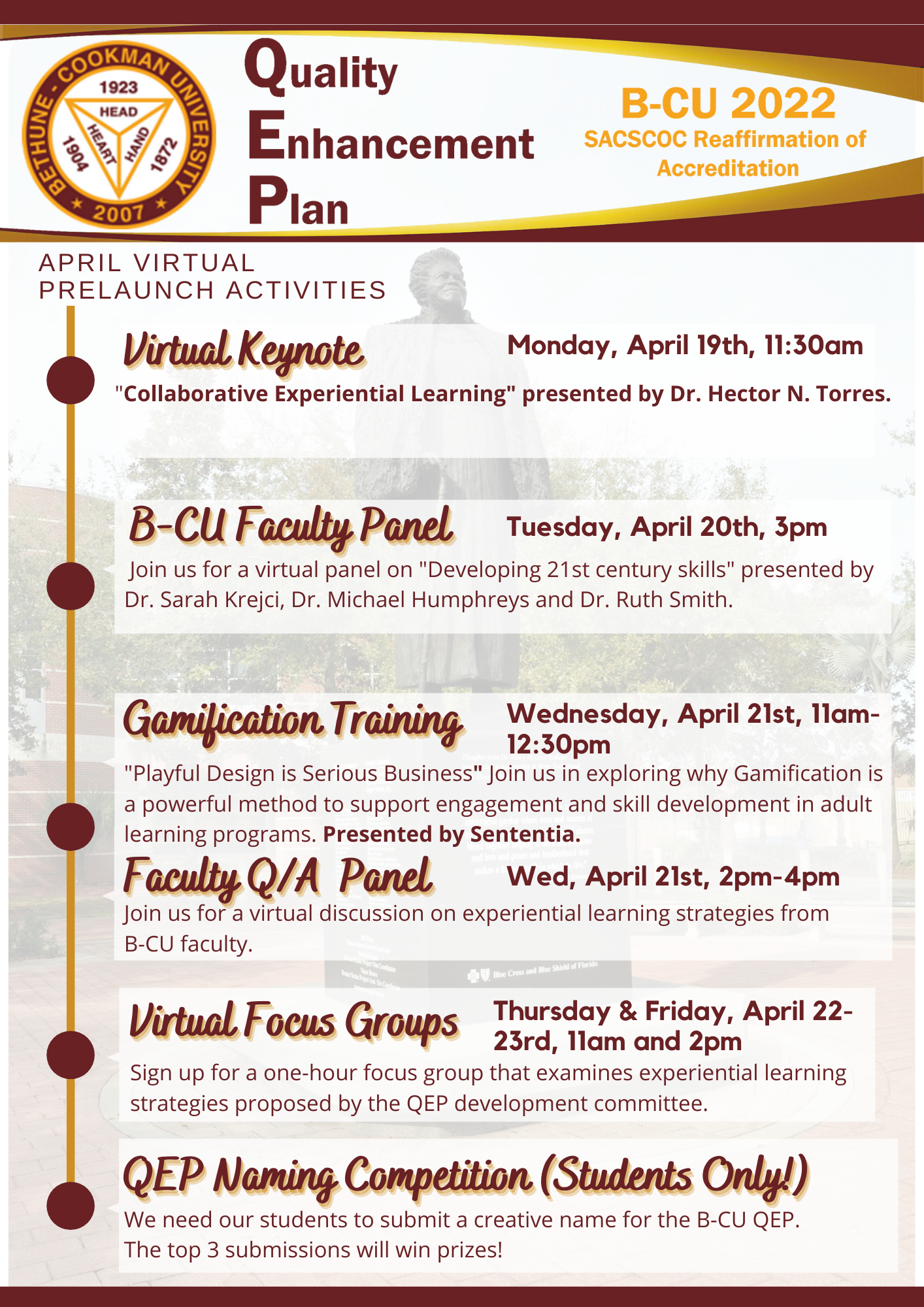QEP Committee and Development

April Pre Launch Activities
In April 2021, the QEP development committee engaged the campus community with an update on the QEP topic and concept paper during an “QEP April Virtual Prelaunch Week.” The week began with a keynote presentation by Dr. Hector Torres, on “Collaborative Experiential Learning”. On Day two a virtual Faculty Panel on “Developing 21st century skills” was presented by three faculty at B-CU who utilize collaborative experiential learning and 21st century skills in their teaching at the university. On Day 3, a training seminar on Gamification by Sententia was open to the campus community and attended by ten faculty, two administrators, eight undergraduate students, seven staff, and five external consultants. Also on day 3, a faculty Q/A panel where six members of the campus community shared their use of collaborative experiential learning used in courses at B-CU and a Q/A period allowed discussion of how to implement best practices. On days 4 and 5, virtual focus groups were established to discuss the collaborative learning strategies presented by the QEP development committee.

Steering Committee Formation and QEP Development
In June 2021, following the concept paper and April Prelaunch activities, the QEP topic was merged into “Together We R.I.S.E.: Reimaging Innovations in Student Experiential Learning.” On June 1st, Dr. Sarah Krejci was promoted to the Director of the QEP and chair of the QEP Steering Committee. The QEP Development Committee was retired and the QEP Steering Committee was formed and divided into four subcommittees: topic refinement subcommittee, budget subcommittee, data and assessment subcommittee, and marketing and communications subcommittee. The subcommittees assisted in the writing and development of the final QEP proposal.

Definitions
Bethune-Cookman University refers to “collaborative experiential learning” as an active learning process for students to apply knowledge gained from hands-on and/or real-world settings and develop transferable, career-focused skills of argumentation/reasoning, flexibility/adaptation, and/or teamwork/collaboration through team-based experiences which promote cooperation and partnerships between individuals and groups at various levels, both inside and outside the institution.
Collaborative experiential learning activities may occur across courses, programs, within a single course, or outside of the traditional classroom and may include, but not limited to:
- Apprenticeship / Fellowship / Internship
- Case-studies / Role-playing
- Clinical Experience / Practicum / Student Teaching / Job Shadowing / Field Work
- Simulations / Gaming
- Undergraduate Research
- Service learning / Volunteering
- Study Abroad
- Creative group projects/ Joint problem solving.
- Debates

Reasoning and Argumentation
- Argumentation is a collaborative discussion two parties can utilize to resolve an issue (Andriessen, 2007, p 443) utilizing the skills of (1) sensemaking (2) articulation and (3) persuading (Berland and Reiser, 2009).
- Reasoning is a central intellective ability involved in solving problems, making judgments and decisions, and formulating ideas and beliefs (Cerbin, 1988)
Flexibility and Adaptability
- Flexibility- (In the context of education) flexible thinking is a key competency necessary for adapting to new learning environments, for transferring knowledge to new situations, and for understanding and solving unfamiliar problems (Barak and Levenberg, 2016).
- Adaptability is an individual's ability, skill, disposition, willingness, and/or motivation to change or fit different task, social, or environmental features (Ployhart and Bliese, 2006).
Teamwork and Collaboration
- Teamwork is the utilization of a set of skills such as the setting of team goals, monitoring work progress, and the effective navigation of team dynamics in order to foster the success of groups or teams. (Hughes and Jones, 2011)
- Collaboration is a process when individuals interact through formal and informal negotiation, jointly creating rules and structures governing their relationships and ways to act or decide on the issues that brought them together; it is a process involving shared norms and mutually beneficial interactions (Thomson et al., 2007)





